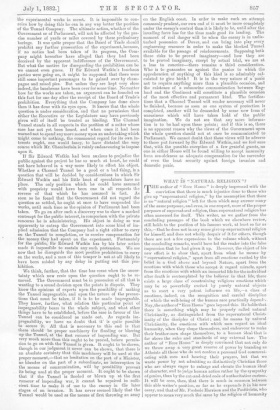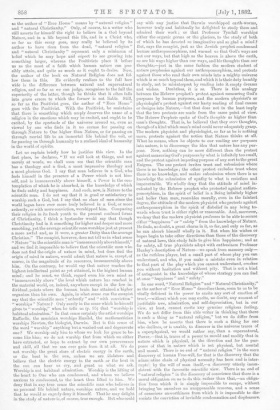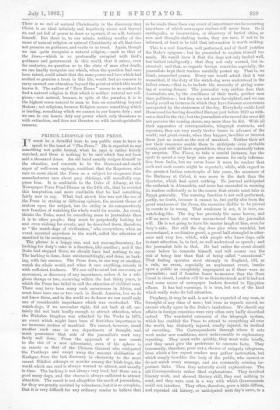WHAT IS "NATURAL RELIGION"?
THE author of " Ecce Homo" is deeply impressed with the conviction that there is much injustice done to those who give up "supernatural religion," by the assumption that there is no "natural religion" left for them which may answer many of the same purposes, and even, in one respect, more of the proper purposes of supernatural religion, than supernatural religion has often answered for itself. This writer, as we gather from the concluding passages of the book which we elsewhere review, still holds to the position of his famous work, at least so far as this,—that he does not in any sense give up supernatural religion for himself, and does not wholly despair of it for others, though there are not a few expressions in the volume which, without the concluding remarks, would have led the reader into the false impression that he had given it up. However, the object of his new effort is to show that, apart from what he moans by "supernatural religion," apart from all emotions excited by the belief in a God above and beyond Nature, apart from the emotions with which those who accept it regard miracle, apart from the emotions with which an immortal life for the individual after death is contemplated by the believer in that life, there exists a large class of constraining religious emotions which may be 80 powerfully excited by purely natural objects as to exert a very potent influence on life,—a class of emotions, indeed, on the recognition and careful discipline of which the well-being of the human race practically depend. Nay,the author of "Ecce Homo" goes beyond this. He holds that there is something whiih may be properly called natural Christianity, as distinguished from the supernatural Christ- ianity of the disciples of Christ ; and. he means by natural Christianity, the emotions with which men regard an ideal humanity, when they shape themselves, and endeavour to make their brother-men shape themselves, to a human ideal that is far above the rules and standards of any external law: The author of " Ecce Homo" is deeply convinced that not only do we throw away a very great reserve of power by branding as Atheists all those who do not confess a personal God communi- cating with men and hearing their prayers, but that we waste power by not admitting as distinctively Christian those . who are always eager to enlarge and elevate the human ideal of character, and to judge human action rather by the sympathy of genius, than by the cut-and-dried code of authoritative custom. It will be seen, then, that there is much in common between this able writer's position, so far as he expounds it in his new essay, and, that of Mr. Frederic Harrison and the Positivists, who appear to mean very much the same by the religion of humanity
as the author of " Ecce Homo means by "natural religion" and "natural Christianity." Only, of course, to a writer who still asserts for himself the right to believe in a God beyond Nature, and in a life beyond this life, and in a Christ who, so far as this essay goes, may really be believed by its author to have risen from the dead, "natural religion" and "natural Christianity" represent only a minimum of belief which he may hope and expect to see growing into something larger, whereas the Positivists place it before us as the most of a faith which human nature can pos- sibly attain, and quite as much as it ought to desire. Now, the author of the book on Natural Religion does not fol- low them in this. He evidently realises to the full how wide is the difference between natural and supernatural religion, and so far as we can judge, recognises to the full the superiority of the latter, though be thinks that it often falls into grave errors to which the former is not liable. Still, so far as the Positivist goes, the author of " Ecce Homo" goes with the Positivist. With the Positivist, he maintains that there is something which amply deserves the name of a religion in the emotions which may be excited, and ought to be excited, by the spectacle of the universe around us, even as viewed by one who finds in it no excuse for passing on through Nature to One higher than Nature, or for passing on through mortal life to an immortal life behind the veil, or for passing on through humanity to a realised ideal of humanity in the world of spirits.
Let us explain briefly how he justifles this view. In the first place, he declares, "If we will look at things, and not merely at words, we shall soon see that the scientific man has a theology and a God, a most impressive theology and a most glorious God. I say that man believes in a God, who feels himself in the presence of a Power which is not him- self, and is immeasurably above himself, a Power in the con- templation of which he is absorbed, in the knowledge of which he finds safety and happiness. And such, now, is Nature to the scientific man. I do not say that it is good or satisfactory to worship such a God, but I say that no class of men since the world began have ever more truly believed in a God, or more ardently, or with more conviction, worshipped him. Comparing their religion in its fresh youth to the present confused forms of Christianity, I think a bystander would say that though Christianity had in it something far higher and deeper and more ennobling, yet the average scientific man worships just at present a more awful and, as it were, a greater Deity than the average Christian." The essayist, however, does not tell us in what sense "Nature "to the scientific man is " immeasurably above himself," and we find it impossible to believe that the scientific man who does not find the origin of nature in mind, but does .811d the origin of mind in nature, would admit that nature is, except, of course, in the magnitude of its resources, immeasurably above him. On the contrary, he would say that nature reaches the highest intellectual point as yet attained, in the highest human mind ; and he must, we think, regard even his own mind as "immeasurably above" the level which nature has reached in the material world, or, indeed, anywhere except in the few in- dividual. points where the human brain has attained a higher organism than his own. Again, in what sense can the essayist say that the scientific man ardently" and "with conviction" " worships " Nature P Only surely in the sense which be himself gives to "worship," when he tells us (p. 95) that "worship is habitual admiration." In that sense certainly the artist worships Raffaelle, the musician worships Han&l, the mathematician worships Newton, the biologist, Darwin. But is this sense of the word " worship " anything but a washed-out and degenerate one F We worship only him to whom we look for grace to be- come like him ; we do not worship that from which we either have extracted, or hope to extract by our own perseverance and skill, all that we can ever gain from it at all. We do not worship the great store of electric energy in the earth, or the heat in the sun, unless we are idolaters and believe that the electric energy in the earth or the heat in the sun can hear us cry, and grant us what we ask. Worship is not habitual admiration. Worship is the lifting of the heart to One who can condescend, and whom we believe anxious to condescend, to the heart thus lifted to him, We deny that in any true sense the scientific man who believes in no personal life behind nature, worships nature, and we hold that he would as eagerly deny it himself. That he may delight in the study of nature is, of course, true enough. But who could say with any justice that Darwin worshipped earth-worms, however truly and habitually he delighted to study them and admired their work ; or that Professor Tyndall worships either the organic germs or the glaciers, to the study of both of which he has devoted so imaginative and so glad a mind P But, says the essayist, just as the Jewish prophet condemned human anthropomorphism, and warned us that God's ways are not our ways, but that high as the heaven is above the earth, so are his ways higher than our ways, and his thoughts than our thoughts,—just in the same fashion the modern student of nature prophesies against our anthropomorphism, and protests against those who read their own minds into a mighty universe which is so much beyond them, and which it is their duty humbly to study, not to misinterpret by reading. into it empty dreams and wishes. Doubtless, it is so. There is this analogy between the Hebrew prophet's protest against measuring God's purposes by human purposes, and the modern physicist's or physiologist's protest against our hasty reading of final causes or designs into Nature,—but that does not in the least imply that the two protests are made from the same point of view. The Hebrew Prophets spoke of God's thoughts as higher than man's thoughts. That is, he believed that they were thoughts, though of a kind which man's mind could never adequately grasp. The modern physicist and physiologist, so far as he is nothing more, protests against the notion that Nature thinks at all. What he means, when he objects to our reading our purposes into nature, is to discourage the idea that nature has any pur- pose. Now, nothing can be more different than the protest against measuring God's purposes by what is infinitely too small, and the protest against imputing purpose of any sort to the great Enigma. The one protest invites trust and submission where there is no knowledge ; the other protest excludes trust where there is no knowledge, and makes submission where there is no knowledge the submission of apathy to what is resistless and impenetrable. We wholly deny. that .the attitude of mind in- culcated by the Hebrew prophet who protested against anthro- pomorphism, in the spirit of belief in a Being infinitely higher and holier than man, resembles morally, even in the faintest degree, the attitude of the modern physicist who protests against anthropomorphism in the spirit of disbelief in any being to- wards whom trust is either right or reasonable. And, moreover, we deny that the modern physicist professes to be able to secure either "happiness" or " safety " from the knowledge of Nature. He finds, no doubt, a great charm in it, so far, and only so far, as he can absorb himself wholly in it. But when his wishes or hopes begin to take other directions than those of the discovery of natural laws, this study fails to give him happiness ; and as for safety, all true physicists adopt with enthusiasm Professor Huxley's description of Nature—we speak from memory only— as the ruthless player, but a small part of whose play you can understand, and who, if you make a mistake even in relation to that part of the play which you cannot understand, crushes you without hesitation and without pity. That is not a kind of antagonist in the knowledge of whose strategy you can find at once " happiness " and " safety."
In one word, "Natural Religion" and "Natural Christianity," as the author of" Ecco Home" describes them, seem to us to be vitally deficient in the power to excite any sort of emotion of trust,—without which you may excito, no doubt, any amount of justifiable awe, admiration, and self-depreciation, but in our view, at least, cannot excite any genuine religious fooling. We do not differ from this able writer in thinking that there is such a thing as "natural religion," but we do differ frora him, when he asserts that there is such a thing for one who declines, or is unable, to discover in the universe traces of a superphysical, we would rather say, than a supernatural, Power,—that is, traces of a power to mould and modify that in nature which is physical, in the direction and for the pur- poses of that in nature which is not physical, but mental and moral. There is no end of "natural religion" in the mere discovery of human Free-will, for that is the discovery that the edam: utine chain of physical necessity has been and is inter- ruptc by the will of man itself,—a discovery utterly incon- sistent with the favourite scientific view. There is no end of "natural religion "in the discovery of conscience that there is a moral obligation on us to do this rather than that,—an obliga- tion from which it is simply impossible to escape, without bringing 'on ourselves an unappeasable remorse, and a sense of conscious unworthiness from which it is impossible to dis- sociate the conviction of invisible condemnation and displeasure. There is no end of natural Christianity in the discovery that Christ is an ideal infinitely and hopelessly above and beyond us, and yet full of power to draw us upward, if we will, towards himself. But there is, to our minds, nothing worthy of the name of natural religion or natural Christianity at all, that does not promise us guidance, and excite in us trust. Again, though we can quite recognise a natural religion,—such as that of the Jews,—which is so profoundly occupied with God's guidance and government •in this world, that it raises, even for centuries, no question as to the state of man after death, we can hardly recognise one which, when the question had once been raised, could admit that the same power and love which had excited so genuine a trust in this life, would feel no concern to carry onward our education beyond the point at which this world leaves it. The author of "Ewe Homo" seems to us content to find a natural religion in that which is neither natural nor reli- gious,—not natural, because, in spite of the paradox, it is in the highest sense natural to ma.i . to lean on something beyond Nature ; not religious, because Religion means something which is binding, something which we cannot in our hearts defy ; and we can in our hearts defy any power which only threatens us with extinction, and does not threaten us with inextinguishable remorse.




































 Previous page
Previous page